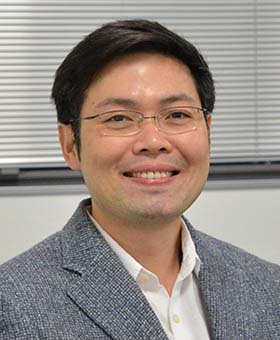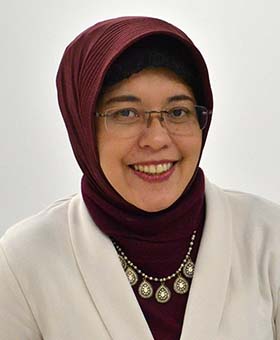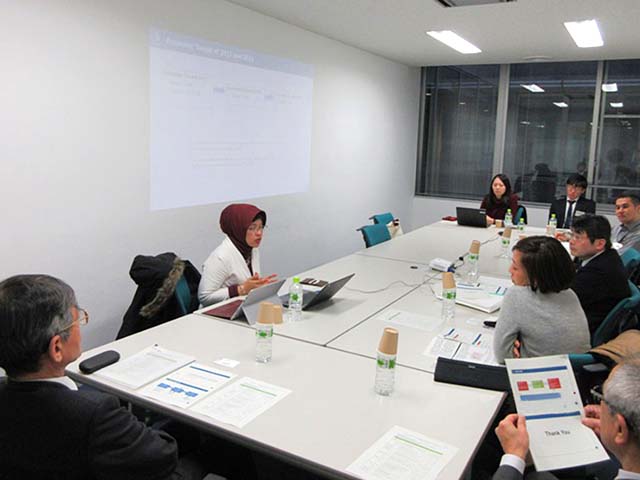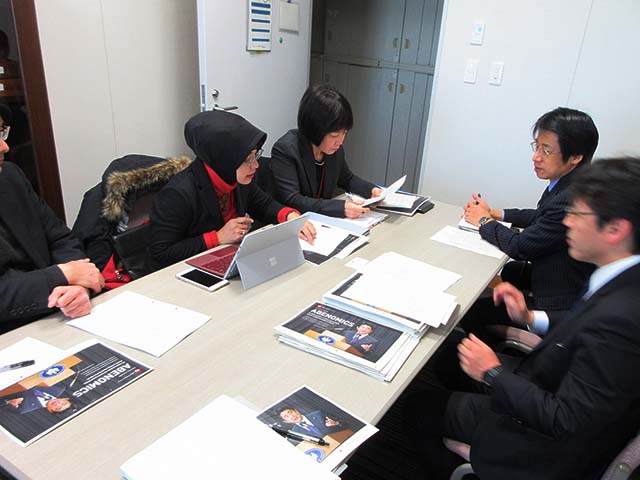3rd Batch Fellows (FY2017-)
Here you can view reports on visits to Japan by the 3rd batch fellows who started the SPRI program in 2017.
* The information about the fellows is correct as of the interview.
Dr. Kanitsorn Sumriddetchkajorn(Thailand)
Director of the Bureau of International Affairs on Universal Health Coverage, National Health Security Office, Thailand
POLICY ISSUE: Universal Health Coverage (UHC)
Dr. Kanitsorn is Director of the Bureau of International Affairs on Universal Health Coverage at National Health Security Office, Thailand. The Bureau is undertaking a collaborative project with JICA, with the three objectives of 1) building capacity of Thai health professionals 2) building capacity of health professionals in other countries and 3) communicating the knowledge gained to the rest of the world. Through the SPRI Program, Dr. Kanitsorn is researching how to resolve issues with and improve UHC in Thailand, under the guidance of top experts in this area, GRIPS Professors Kenji Shimazaki and Taichi Ono.
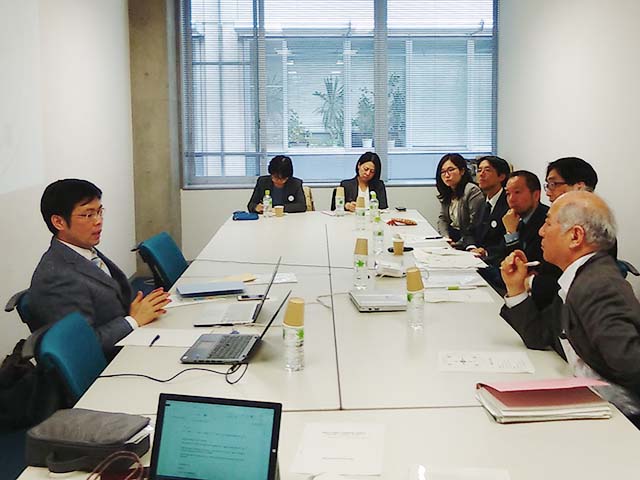 Wrap-up session with JICA officers and advising professors (on 1st research visit to Japan)
Wrap-up session with JICA officers and advising professors (on 1st research visit to Japan)
<Comments from Dr. Kanitsorn>
■After 2nd research visit to Japan (March 2018)
Improvement of UHC in Thailand through discussions with top experts
UHC is a very broad topic, and it is therefore important to first determine the right theme, which will impact many other connected issues once solved or acted upon. During my two research visits thus far, through discussions and with the advice of the professors, I have finally narrowed down the topic for in-depth research. In subsequent visits, I hope to start going to related sites to investigate, and begin my research related to policy proposals. The Thai and Japanese UHC systems are very different, and it would not be feasible to implement the Japanese system as it is. However, the Japanese system is very precise and it remarkable for how everything is connected. The professors are very knowledgeable about UHC in general, and the way they think comes with experience and results. You cannot get such insight from a textbook. These discussions are very important to my research.
The SPRI Program is a great opportunity for Japan and ASEAN countries to pool their intellectual capital. It doesn’t matter if we have differences regarding the specific topic – what is important that we cooperate intellectually.
Dr. Amalia Adininggar Widyasanti(Indonesia)
Director of Macroeconomic Planning and Statistic Analysis, Ministry of National Development Planning (BAPPENAS), Indonesia
POLICY ISSUE: Macroeconomic policy Management
Dr. Amalia is responsible for proposing macroeconomic policy at the Macroeconomic Planning and Statistics Analysis, Ministry of National Development Planning (BAPPENAS). She works on economic models and their assessments, and researches and analyses the underlying policies. Through the SPRI Program, and with the cooperation of the Cabinet Office and the Ministry of Economy, Trade and Industry, she is holding discussions with various economic specialists for her research into how to better propose more precise macroeconomic policy.
Left: Wrap-up session with JICA officers and advising professors (on 1st research visit to Japan), Right: Discussion with the Cabinet Office officers on Japan Growth Strategy (on 1st research visit to Japan)
<Comments from Dr. Amalia>
■After 2nd research visit to Japan (January 2018)
Working to propose more precise macroeconomic policy
As consumer spending falls globally, negatively affecting trade, how are Indonesia and Japan affected by newly arising economic issues – represented by the USA Trump Administration’s decision to withdraw from the TPP – and how must we react? Most of my work is taken up with research and analysis along these lines. Through the SPRI Program, I am able to receive specific advice on my economic models from officials in charge of Abenomics in the Cabinet Office and hold discussions with Professors who are leading experts in fiscal and monetary policy. This means I have been able to produce a level of research that would not have been possible in Indonesia.
I am very lucky to have been able to participate in the SPRI Program and see how Japan manages economic matters, particularly the role the Japanese administration plays in economic issues through the Central Bank and fiscal policy. However, Indonesia has a very different background and different conditions to Japan. My work now is to deepen my own understanding and investigate the best way to apply this research to Indonesia.
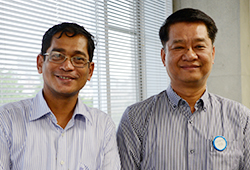
Mr. Sai Thet Naing Moe (Myanmar) (Right)
Director, Urban and Housing Development Department, Ministry of Construction (Bago regional government)
POLICY ISSUE: Land Policy and Management From the housing Development Viewpoint
Mr. Zaw Zaw Aye (Myanmar) (Left)
Deputy Director, Urban and Housing Development Department, Ministry of Construction
POLICY ISSUE: Land Policy and Management From the Regional and Urban Development Viewpoint
Mr. Sai Thet Naing Moe and Mr. Zaw Zaw Aye are administrative officials at Myanmar’s Ministry of Construction, and they are carrying out research into land policy management and with the cooperation of Japan’s Ministry of Land, Infrastructure, Transport and Tourism (MLIT). Myanmar was once known as one of the least urbanized countries in Asia, but handling of the rapid urbanization that has taken place along with steady economic growth over recent years is now a pressing issue. Mr. Sai Thet Naing Moe is responsible for development in local government and also oversees coordination with the central government while Mr. Zaw Zaw Aye is involved in urban development in the central government. It is from these perspectives that they carry out their research into the common issues that they face. In the program to visit Japan, GRIPS provides them with lectures by MLIT officials and research guidance by GRIPS professors, as well as other opportunities such as the chance to see how recovery support for the Great East Japan Earthquake is being implemented.
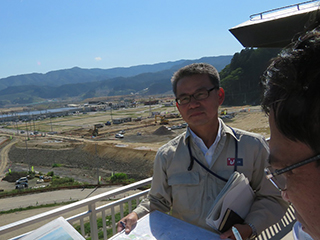
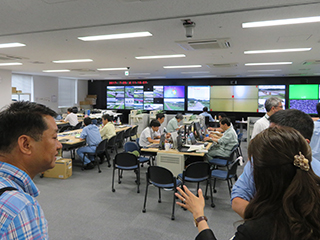
Left: Learning about land readjustment (in Rikuzentakata on the 2nd research visit to Japan), Right: Visiting disaster response headquarters as it tackles heavy rain in Akita (in Sendai on the 2nd research visit to Japan)
<Comments from Mr. Sai Thet Naing Moe and Mr. Zaw Zaw Aye>
■After 2nd research visit to Japan (July 2017)
Valuable information leading to new land policy and management
The Constitution of Myanmar was enacted in 2008 and stipulates that administrative authority shall be decentralized, meaning urban development now falls under the jurisdiction of local authorities. However, due to the lack of human resources and experience, local authorities currently undertake urban development with the support of the central government. The country as a whole is currently standing at a historical turning point, and the extent to which land for urban development can be procured and administered is a pressing issue. All workshops and survey programs in this SPRI program are put together exclusively for the purposes of the policy issues that we have compiled, and many ideas have come up thus far from the plethora of information that helps us in our policy research. Japan has an excellent land management system, so much so that there are many aspects we would like to incorporate immediately, such as the land registration system and the way information is smoothly exchanged between different departments.
On this visit, we got to see support for recovery from the Great East Japan Earthquake, and the initial emergency response and the speed of recovery from such a large disaster was remarkable. When we are looking into specific steps to take henceforth in terms of land management in Myanmar, we hope to incorporate everything, including such emergency response, and put together something exceptional.





